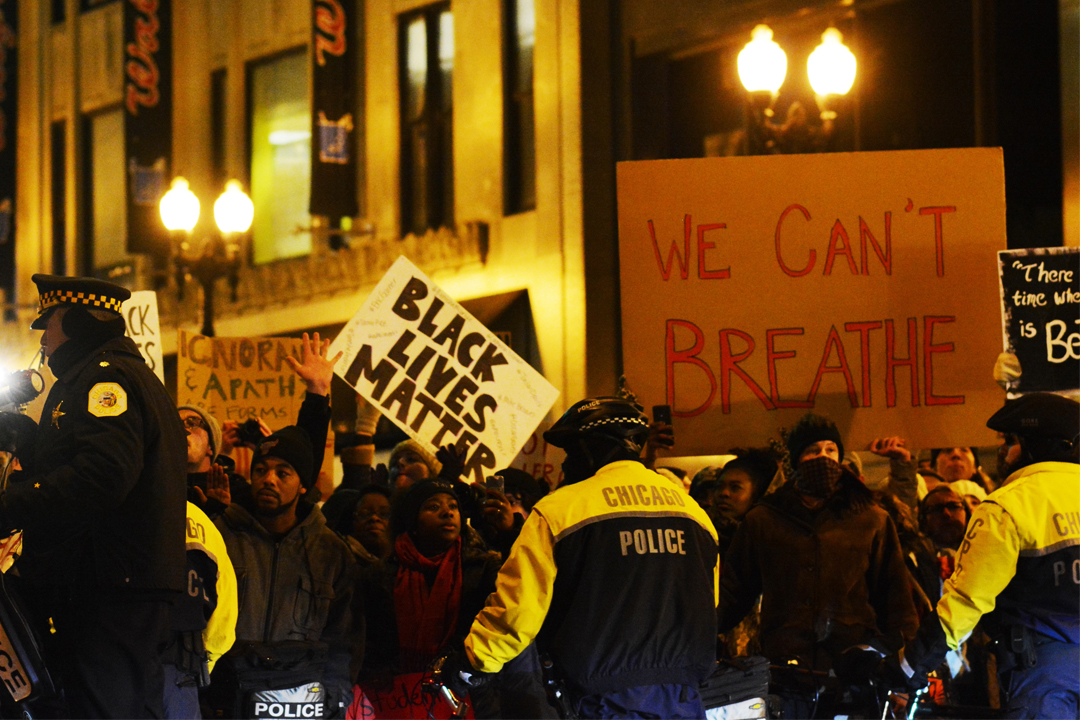On Monday, June 15, GW Law offered an online forum, Lessons From Today: Race, Policing, and the Future of the Criminal Legal System, to connect what’s happening on America’s streets amid the protests, police violence, and the Black Lives Matter movement, to what’s happening in law school classrooms and clinics. Hosted by the GW Criminal Law and Policy Initiative and the Criminal Law Society, the forum was led by GW Law professors Roger Fairfax, Patricia Roberts Harris Research Professor of Law; Jessica Steinberg, Associate Professor of Clinical Law; and Kate Weisburd, Associate Professor of Law. Nearly 70 participants attended.
“The role of law schools at this moment is monumental,” Professor Weisburd began the forum. “This is not the time to sit by on the sidelines, but the time to confront and solve deeply entrenched racial inequities in our criminal legal system.” Professor Weisburd, whose research and writing focus on alternatives to incarceration and street-level implementation of criminal justice reform, emphasized to participants that the forum was an opportunity to begin what should become an ongoing dialogue.
Professor Fairfax launched the exploration by asking, “How do we promote accountability for law enforcement professionals who take the lives of black people?” An expert in criminal law and procedure, a contributor to the book Policing the Black Man: Arrest, Prosecution, and Imprisonment (Penguin Random House, 2018), and Founding Director of GW Law’s Criminal Law and Policy Initiative, Professor Fairfax has long studied this question.
Professor Fairfax displayed the original and amended complaints filed against former Police Officer Derek Chauvin for the murder of George Floyd, then he explored the differences between first-, second-, and third-degree murder charges in Minnesota, along with the prosecution’s possible strategies for choosing each one. He then parsed the provisions of the Justice in Policing Act of 2020 (18 USC 242 Mens Rea), which was presented in the House of Representatives earlier this month. Provisions of that bill, he explained, could have altered the story of George Floyd by providing needed reforms such as banning chokeholds and carotid artery restraint and mandating police officers to intervene against fellow officers in instances of abuse.
But what does real reform of the criminal justice system look like, and how will we know if reform is working?, Professor Weisburd continued. When inequity is “baked into the criminal legal system,” she said, “we need not to tinker around the edges but to re-conceptualize the role of our criminal justice system. It’s time we grapple with hard, important conversations.” She urged students to begin asking such questions in their courses by examining the legal system as well as any efforts towards reform in terms of whether they disrupt or perpetuate racial inequities.
Professor Steinberg agreed, “Through my work, I see on a daily basis the effects of widespread racial injustice in the criminal system.” Professor Steinberg, who directs GW’s Prisoner and Reentry Clinic, is a nationally recognized expert on access to justice, court reform, parole, and offender reentry. She is currently playing a leading role in helping medically vulnerable DC prisoners gain early release. Professor Steinberg discussed the impact of the COVID-19 epidemic on jails and on prisoners who have little to no access to protective measures, noting that criminal justice reform could have a significant impact on this issue.
As participant discussions began, current law students asked what they could do to best prepare themselves to promote criminal justice reform once they enter the profession.
All three professors were adamant: Don’t wait until you graduate. Professor Fairfax summed it up: “If I were a law student here at GW, I’d be asking, ‘I’m here steps from the epicenter of the DC protests, so how do I make a difference now as a 2L or 3L?’”
Professor Steinberg suggested that students get involved by following local legislation, encouraging students to “show up, speak up” at city council meetings, particularly at meetings that involve issues of reform. Members of the public are needed to support legislation, she said, and keep it from dying in committee.
Professor Weisburd offered three suggestions for current law students. First, she said, quoting Bryan Stevenson, legal activist and author of Just Mercy, “get proximate to injustice.” Get into criminal courts through clinics and internships that let you see the true workings of the system, she urged. Second, she suggested that students pay close attention to election campaigns for prosecutors. “Prosecutors hold a lot of power,” she said. “It’s important to find good advocates for reform and work to get them elected.”
Finally, she encouraged students to have conversations with family and friends that “pass along the knowledge” that students are gaining regarding the law. “For instance, you might discuss what constitutes first versus second degree murder in the George Floyd case and how that affects the charges filed,” she said. Professor Fairfax agreed. “It’s important for law students to pay attention to nuances of all arguments and engage with others, even if you don’t agree with their point of view,” he said.


